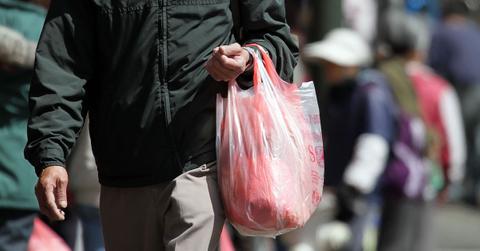Single-Use Grocery Bags Are Becoming Obsolete in the U.K.
The U.K.'s 5p fee on bags has been extremely effective.
Updated Aug. 1 2019, 11:56 a.m. ET

Charges on supermarket plastic bags: Embraced by environmentalists, scoffed at by people who like to double-bag everything they buy, and apparently, very effective. In 2015, England introduced a nationwide 5-pence fee (about 6 cents in USD) on plastic bags. And over the past year, sales of said bags has gone down by a whopping 90 percent at the country's seven major supermarket chains. In fact, the average consumer at those chains is now only taking 10 plastic grocery bags per year.
The U.K. Department for Environment Food & Rural Affairs (Defra) shared the data on the government website on Wednesday, July 31. From April 2017 to April 2018, 249 retailers reported sales of 1.75 billion bags; and from April 2018 to April 2019, 221 retailers reported 1.11 billion bags — that's a total decrease of 37 percent.
But even more interesting is data from the "large" grocery retailers, which Defra explained are all legally required to report plastic bag sale numbers to the agency. Those chains are Asda, The Co-operative Group, Marks and Spencer, Morrisons, Sainsbury’s, Tesco, and Waitrose. From April 2017 to April 2018, all seven chains reported a total of 1.04 billion bags being sold; and from April 2018 to April 2019, 221 retailers reported total sales of just 0.55 billion bags. That's a decrease of 90 percent.
Additionally, from April 2017 to April 2018, an average of 19 bags were sold per customer at the seven main retailers, going down to just 10 per person from April 2018 to April 2019. And in terms of all retailers reporting, the bags-per-customer rate went down from 32 to 20 per year. So not only has England's compulsory fee saved billions of single-use supermarket bags over the past few years, but it has also clearly made an impact on customers, who are refusing to take plastic bags more and more.
And on top of all that, many grocery stores have opted to donate a portion of the 5p fees to charities. According to Defra's data, 3.6p out of every 5p charge, which is about £22.9 million (about $27,785,692 USD), was donated to charities between April 2019 and April 2019. But in the previous year (April 2017 to April 2018), 3.8p out of every 5p charge, totaling about £51.6 million (about $62,610,717 USD), was donated.
Plastic bags are difficult to recycle, since they cannot go in curbside recycling, but must be dropped off at designated recycling bins (often found at large grocery stores and pharmacies). For that reason, most customers do not actually recycle these bags, and instead send them to landfill, where they take hundreds of years to break down.
All this data from the U.K. proves that a charge on plastic bags — even a charge as small as a few pennies — makes a huge impact. And considering the fact that the average American family gets about 1,500 single-use plastic carrier bags every year, according to the Center for Biological Diversity, the U.S. might be a great place to implement this scheme next.